Scala London Coding Dojo
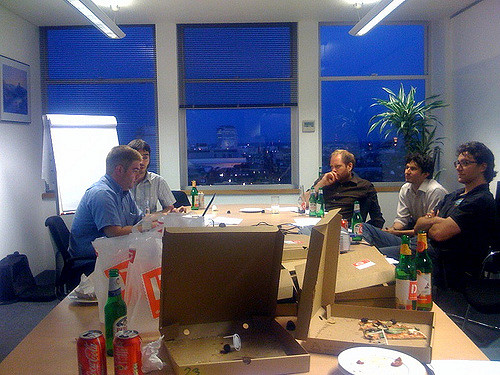
Monday was the first Scala London User Group meeting that was held around a keyboard. Robert Rees arranged for a room, food, and drink at ThoughtWorks, Jamie Webb kindly gave an intro to Scala talk, and Aaron Roth provided print outs of a Scala for Java Programmers cheat sheet…and so we spent time working on the supermarket problem.
I counted 19 people (of which 3 were Brighton based), of mixed abilty (from functional people or Java people who had never touched Scala, all the way to expert Scala-heads), and we had working, unit tested, software by 10pm. Which—given that coding dojos sound a bit mad—is pretty good going.
Comparing closures in Java, Groovy and Scala
On Paul’s return from JavaOne this year, we spoke about Neal Gafter’s Closures Cookbook talk. From what I understood, this was a look at the BGGA closures proposal, and contained an example that pushed hard on some of the tougher closure issues for Java. I thought it might be fun to look at the Java example from the talk, and covert it to Scala and Groovy.
Why those languages? Because they are the three JVM languages I’m most interested in. I suppose I could also have compared the closure support in Jython, JRuby or… well, there are a few to choose from, but this blog is going to be plenty long enough with just three.
Mobile Monday: Monetisation through Advertising
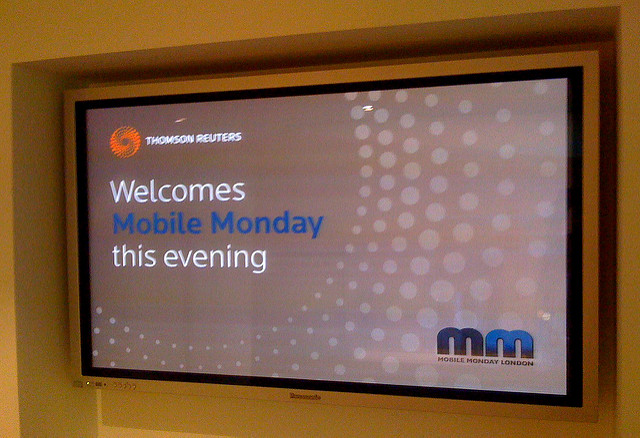
Last night I was at Mobile Monday London to catch four presentations. The topic: advertising on mobile. The summary: there’s a need for better measurement.
Claire Valoti from Mindshare was up first, giving the agency view of mobile advertising. She split the appeal of mobile in a media plan in to two parts: as a delivery mechanic (to extended reach, getting to a winder audience in a different mode); and as a platform (for couponing, or video uploads). She then went on to describe some issues and themes… and standardization and measurement were pretty much top of the list. That is, there’s currently no good standard measure of reach, sessions, traffic or users for mobile advertising. And even if there was, it needs to be integrated into existing web buying systems, rather than via a mobile-specific system.
Decrypting JetS3t Files
This post is going to be a bit niche. The scenario is that you’ve used
JetS3t to backup data to Amazon S3 via the synchronize tool,
and in particular you’ve used the -c option to encrypt the data. But
you’ve downloaded the file with another tool, such as ForkLift or
S3 Browser. How do you decrypt the downloaded file?
The default encryption is PBEWithMD5AndDES, and with that knowledge you
may be able to find a tool that can decrypt it for you. I went a
different way, and just hooked straight into the encryption utilities
inside JetS3t:
QuickTime for Java
A few months ago I was experimenting with QuickTime for Java. It’s the binding between Apple’s QuickTime “stuff” and the Java language, allowing a Java developer to invoke QuickTime on the Mac (and presumably also on Windows). The reason this appeals is that we do Java, and have accumulated a fair amount of Mac hardware.
To cut a long story short, my limited experienced shows that QuickTime, when compared to the standard Java image libraries, produced smaller images of higher quality, faster. It’s unusual to get all three benefits together (smaller, faster, better). Too good to be true, even, which leads me to think I’ve screwed up someplace, but I’ve not spotted it yet.
Getting Started with Scala
Friday night was the first London Scala User Group meet-up, so it seems like the right time to say what I’ve learned so far about the language.
I’m not a functional programming person. My background, pre-Java and C, was dominated by POP-11 so it’s fair to say I’m more comfortable with imperative coding than anything else. But that’s kind of why Scala’s a serious consideration for me: it doesn’t force the functional stuff down your throat, but rather it’s all there, object and functional, so you can pick and choose.
Android Developer Workshop
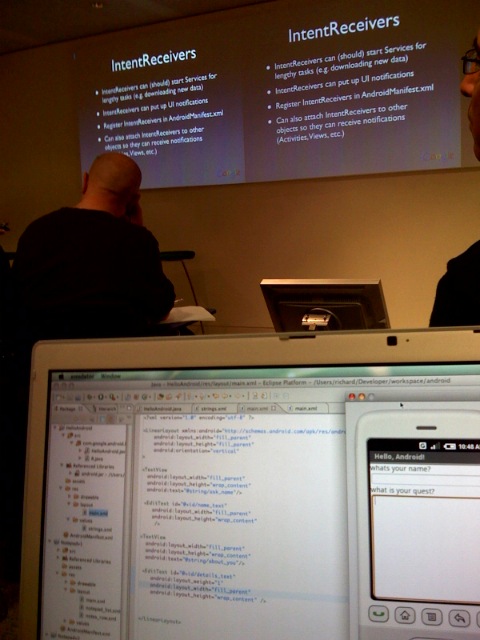
Half-day workshops are great: you get away from distractions; get to ask questions and get quick answers to cover off those things that are bugging you; you’re more-or-less forced to spend more time hands-on with a technology; you get a sense of the buzz around something and which bits are good and bad; and… it’s only half a day gone if it doesn’t turn out that way. For those and other reasons I attended the Android Developer Workshop at Google London on 17th December 2007, hosted by Dick Wall. It did a fine job of highlighting the current state of Android and which areas are the important ones to focus on.
Silverlight
I’m impressed with what I’ve heard about Silverlight. Microsoft put on an evening event in Brighton, bought a few beers, and tried to show Silverlight. I say “tried” because it turned into an evening of question answering. Which was fine: I could have done with seeing more, but I guess I can find that online.
Judging by the numbers, there are a lot of people interested in learning about the technology. So what is it? We were told it’s not a “Flash killer”, but you know what… the differentiation between Silverlight and Flash is subtle, so comparisons to Flash are going to be difficult to avoid. It’s probably fair to say it’s not a Flash killer yet, as Flash will have the edge in experience and capabilities for a while. But beyond that, it’s probably not a Flash killer because I suspect Silverlight doesn’t care about Flash or competition from Flash.
Future of Mobile 2007
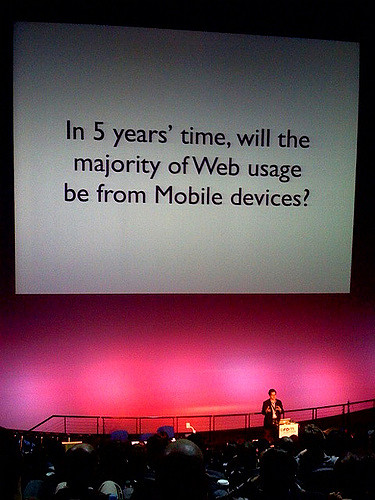
What follows are the remarks or thoughts I noted down…
Consumers
- Mobile phone users are not consumers, but creators. Phone calls, text messages are made up of a create and consume pair. I’ve heard this a great deal lately, especially in the context of the iPhone. There’s clearly some truth in it, but I wonder for how long: if my phone has a music player in it, that’s more consumption that creation. If I’m browsing the web, that’s consumption. If I’m updating a social networking site from my phone, or uploading a photo to Flickr, sure, that creating, but it’s not unique to the phone. Email and IM can also be a create and consume pair, and that’s something you can do on the desktop or the handset. I’m not sure the whole active v. passive consumers meme is terribly useful.
- Mobile’s combination of location plus attention is a unique advertising opportunity.
Content creation
- “Vodafone UK and Novarra are breaking the mobile web”. (See TechCrunch)
- If you’re anti One Web, Luca Passani’s alternative to the W3C’s Mobile Web Best Practices will be something you’ll want to read: Global Authoring Practices for the Mobile Web
- One Web is about thematic consistency: “Ensure that content provided by accessing a URI yields a thematically coherent experience when accessed from different devices.”
- WURFL has 3,000 developers, and WALL (Wireless abstraction library - a markup system to help automatically output the right kind of markup for different devices) is going into a new version: WNG. Slides are available for that announcement.
- .Mobi exists to “help the mobile web grow”. The Device Description Repository (DDR) API is due in Dec 2007/Jan 2008, but isn’t based on WURFL. The reason is that .mobi want to “add trust” and “add industry” to the API, protecting companies against possible royalty payments, and to provide confidence via a brand.
- Google mobile search is currently terrible.
Watching Production Logs
I’ve always believed that production application error logs should be empty. I’ve also implicitly assumed that any errors in live application logs are rare, freakish, occurrences, and on the whole of little relevance. But… what would it take to get an empty error log? Or at least an error log that only contained truly anomalous events?
You know what I mean, right? You sprinkle your code with
log.error("a bad thing happened", exception), and during development
and testing maybe you see them. On your production machines you might be
lucky enough to have someone who knows and watches the logs, or perhaps
you occasionally look at the logs yourself: but on the whole they are
ignored unless someone starts jumping up and down—and then you take a
look at the logs.
Barcamp Brighton 2007
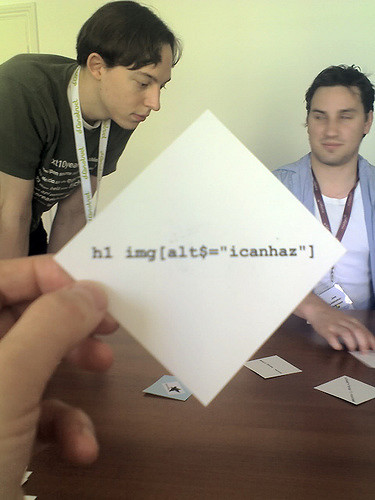
Tick… I’ve now attended a BarCamp. I absolutely loved it: many topics + small groups = a great opportunity to learn and chat about lots of stuff.
Some of the stuff I managed to sit in on, included:
- CSS Selectivity Snap. Earlier in the day I’d jotted a reminder: “must learn more CSS properly”, and then Jon Linklater-Johnson (pictured above, right) steps in with a fantastic crash course in selectivity. Huge fun.
- Jay Caines-Gooby chatting about backups. Nice idea: grab a NAS drive, stick Linux on it, and then schedule syncing to S3.
- QR (quick response) codes, from Tristan Roddis. I didn’t know QR codes were an ISO standard or that there were different variants. I hope Tristan’s laptop has recovered from the water spill :-(
- An enlightening presentation called “Take my wallet but don’t hurt my face: Teenagers & the social web” by Daniel Morris. Another presentation I learned a hell of a lot from: teenagers don’t use mobile internet, don’t send MMSs, and visit a bunch of web sites I’ve never heard of (of course).
- “Building a recommendation engine from tagged content”: it was great to see the inside of an application exposed in terms of how worldreviewer.com is handling user recommendations. They’re taking the tag cloud for users and for activities, and computing a dot product to get a measure. The problem is that if you want to do this real-time the calculations get expensive quickly. The solution being explored is to reduce the space to a fixed-size vector (manually at the moment, but they’re looking to do some form of proper feature extraction).
- Matthew Somerville’s Is Cornwall Part of England? talk was superb. Turns out Cornwall probably has a case for an independent government, but best not to mention it. Statutelaw.gov.uk looks a fun place to spend a few hours.
- Behaviour driven development (BDD), which is “TDD done well”. Appears to be a good way to structure and express unit tests, and I need to go and check out JDave.
I spoke about Mac OS X Server, which is something no-one seems to use. I’ll maybe write up my presentation at some point.
A comment on static typing
There’s a line of thought put forward by Neal Ford to help Java developers get over any hang-ups they may have with dynamic typing. If you like compile-type checking of your types, maybe you’re worried “that utter chaos would reign if we discard typing”. Neil’s argument is that: (a) unit testing is good; (b) 100% code coverage is good; therefore static typing buys you nothing:
“If you have pervasive testing, static typing == more typing. The static typing is nothing but a requirement to type extraneous code to satisfy a compiler that isn’t telling you anything interesting anymore.”
